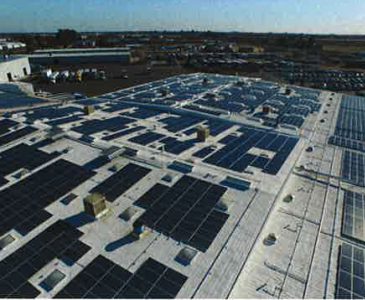Project Overview
The Bee Sweet processing plant includes several conjoined metal buildings, with a combined square footage over 250,000 square feet. Bee Sweet wanted improved waterproofing, a common issue when metal buildings are conjoined. They opted to add 88,600 sf of spray polyurethane foam (SPF) roofing to an existing 133,720 sf SPF roof. To maximize energy efficiency, they concurrently replaced and sealed 54 skylights, and added a 2.4-megawatt photovoltaic (PV) system with over 7,400 solar panels requiring 7,487 standoffs, each penetrating the roof and requiring a leak-resistant seal.
Challenge
Environmental stewardship is one of Bee Sweet’s corporate priorities. Their commitment to be as environmentally friendly as possible in every step of the growing, picking and packing process drove the decision to upgrade their processing plant to conserve electricity and minimize their environmental footprint. This complicated project included SPF roofing, skylight replacement, and installation of a large rooftop PV system. Although the existing SPF roof was already in place, more roofing was needed when the decision was made to add the solar panels. Bee Sweet selected a 2.4-megawatt PV system that covered almost the entire plant, including the existing foam roofs and citrus processing area.
The 88,600 sf processing area had experienced many leaks and needed additional insulation, so a new foam roof was added prior to PV system installation. The massive PV system required a staggering 7,497 standoff brackets fastened into the roof as structure. More than one-third of these brackets were sealed as the new SPF roof system was installed. The remaining brackets had to be installed and sealed in the existing foam roof area. Additionally, the processing area had 54 fiberglass skylight panels that were failing. SPF contractor Central Coating Company removed these panels and installed and sealed 54 new curb-mounted, double-lens skylights to improving lighting and increase safety. Despite the size and scope of this project, all work had to be performed without disrupting daily business operations.

